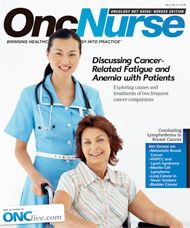Publication
Article
ONCNG Oncology Nursing
The importance of supportive care
The majority of patients with cancer, including those who have completed treatments, experience symptoms related to their cancer or to treatments at some point during their cancer journey.
The majority of patients with cancer, including those who have completed treatments, experience symptoms related to their cancer or to treatments at some point during their cancer journey. One of the most commonly reported problems is fatigue, and it is estimated that approximately 90% of patients undergoing chemotherapy or radiotherapy suffer from this debilitating condition. In some cases, patients may not report experiencing fatigue because they think it is a result of their disease or treatment, or they may be afraid that it is a sign that their cancer is progressing. Because oncology nurses are on the frontlines treating patients and interacting with them, they may be more prone to identifying fatigue in their patients, and only by identifying the problem can steps be taken to help remedy it, which can have a significant impact on a patient’s quality of life and survival outcomes. Our article “Discussing Cancer-Related Fatigue and Anemia with Patients,”, reviews fatigue and anemia (which can contribute to or result in fatigue in patients with cancer), including their causes and steps that can be taken to identify and treat these problems.
One of the steps that can be taken to combat fatigue in patients with cancer is exercise, which can also have other benefits in patients with cancer. In our Fitness Forum, Dr Lisa Marie Bernardo discusses how resistance training may improve physical functioning in patients experiencing breast cancer-related lymphedema. Of course, exercise suggestions must always be tailored to the patient. For instance, patients with myeloma should avoid strenuous activities such as running or tennis because of their weakened bones, but may benefit from more low-impact activities, such as walking.
The end of the year is always a time for reflection and appreciation. As an oncology nurse, you have much to be proud of, and we want to take the time to thank you for all that you do to improve the lives of your patients. As we move into 2010, we wish you health, happiness, and continued success in your endeavors, whether great or small.
